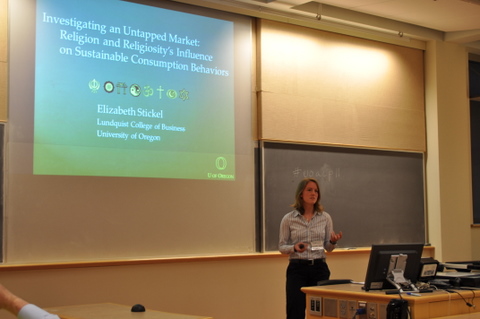
Teaching Vision
My teaching philosophy can be described in four word phrases: (1) experiential learning, (2) real-world, (3) active engagement, and (4) personalization / feedback.
Experiential learning. In my marketing management and advanced marketing management classes, I engage my students in service-based learning with final consulting projects. Students design a marketing plan and promotional materials based on the business’ needs. Student feedback regularly describes this as one of the most meaningful experiences of their college career. I have also taught a custom marketing research course where students collected data to support the launch of a new nature therapy business, and then, based on this data, led their newly designed nature therapy experiences on a backpacking trip at the end of the semester.
Real-world. Class time is filled with lively discussion of marketing concepts, cases, and/or related recent news. I start most of my classes with a recap of the most prominent marketing-related news for the day followed by a short class discussion of the news and relevancy to marketing in general as well as that day's topic of discussion.
Active engagement. I have students analyze cases and concepts using a variety of formats including having students act as key stakeholders, holding debates, and having small and large group discussion. Students are informed that their participation is vital to class time. When relevant, I merge my research interests (e.g., a day discussing religion’s influence on marketing strategy) and work experience (e.g., challenges of marketing in the tourism industry) into my teaching.
Personalization / feedback. To enhance learning and better get to know my students, I utilize a variety of innovative "get to know you" activities. Sometimes this involves elevator style pitches to the class, other times one-on-one meetings, and other times a presentation filled with questions surrounding a student's motivations and purpose in life to get them thinking about how this all applies to their future careers. I use this to personalize scenarios and news in the class to interests as well as know when I can call on students with expertise in different domains during in-class discussion (whether this be actually in-person or over zoom). For the final consulting project in my marketing strategy courses, I require students to form small groups that must meet with me several times throughout the semester. This enables more personalized discussion as well as acts as a quality control measure for me to ensure the client is getting quality work.
Courses
Select Student Comments
My teaching philosophy can be described in four word phrases: (1) experiential learning, (2) real-world, (3) active engagement, and (4) personalization / feedback.
Experiential learning. In my marketing management and advanced marketing management classes, I engage my students in service-based learning with final consulting projects. Students design a marketing plan and promotional materials based on the business’ needs. Student feedback regularly describes this as one of the most meaningful experiences of their college career. I have also taught a custom marketing research course where students collected data to support the launch of a new nature therapy business, and then, based on this data, led their newly designed nature therapy experiences on a backpacking trip at the end of the semester.
Real-world. Class time is filled with lively discussion of marketing concepts, cases, and/or related recent news. I start most of my classes with a recap of the most prominent marketing-related news for the day followed by a short class discussion of the news and relevancy to marketing in general as well as that day's topic of discussion.
Active engagement. I have students analyze cases and concepts using a variety of formats including having students act as key stakeholders, holding debates, and having small and large group discussion. Students are informed that their participation is vital to class time. When relevant, I merge my research interests (e.g., a day discussing religion’s influence on marketing strategy) and work experience (e.g., challenges of marketing in the tourism industry) into my teaching.
Personalization / feedback. To enhance learning and better get to know my students, I utilize a variety of innovative "get to know you" activities. Sometimes this involves elevator style pitches to the class, other times one-on-one meetings, and other times a presentation filled with questions surrounding a student's motivations and purpose in life to get them thinking about how this all applies to their future careers. I use this to personalize scenarios and news in the class to interests as well as know when I can call on students with expertise in different domains during in-class discussion (whether this be actually in-person or over zoom). For the final consulting project in my marketing strategy courses, I require students to form small groups that must meet with me several times throughout the semester. This enables more personalized discussion as well as acts as a quality control measure for me to ensure the client is getting quality work.
Courses
- Marketing Management (syllabus)
- Advanced Marketing Management (syllabus)
- Introduction to Marketing (face-to-face course syllabus; online course syllabus)
- Marketing Communications (syllabus)
- Consumer Behavior (syllabus)
- Marketing Research: Standard Course (syllabus)
- Marketing Research: Nature & the Self (syllabus)
- PhD Seminar in Consumer Behavior (syllabus)
Select Student Comments
Courses Taught & Evaluations
See CV page for a copy of my CV that lists all courses taught and the student evaluation summary statistics for each course.






